Part 41: Our Destiny
Chapter 30: Our Destiny
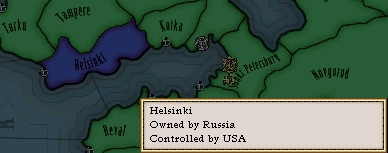
The Americans have invaded Helsinki. Finland sees an odd amount of action in Russian wars. The Americans hold on to the province for a short while before they are driven off by Russian troops.
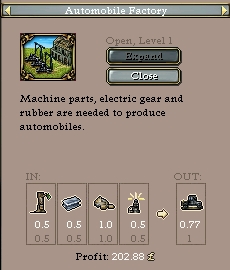
The automobile factory is up and running, and Houston's are coming off the line with incredible speed. This factory is a great boon to our economy, bringing in more than £200 per day. That factory alone creates more wealth than a large number of independent nations.
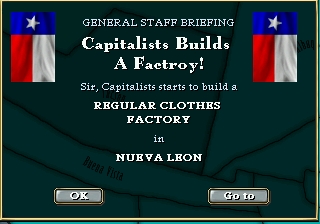
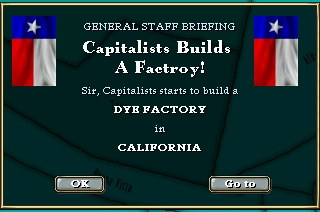
A new clothes factory is going up, which is fine with us, and the Californians are rebuilding their damn dye factory. Well, they gave us what we wanted, so we will try to make sure there isn't another unfortunate accident this time around.
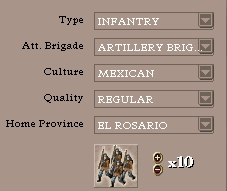
President Villa orders the creation of ten new infantry divisions, each with an attached artillery brigade. They would form the primary fighting unit in Pancho's upcoming war. Panch calls them the "Golden Ten".

France declares war on Brazil, again. Though we curse the French in every way, this is not exactly a bad thing for us. It will keep Brazil preoccupied with fending off French invasions consisting of handfuls of divisions.
The United States and Serbia settle for white peace. This is likely a sign that peace between the US and Russia will come soon.

Our submarines stationed off the coast of Rio de Janeiro reveal to us that the capital is very lightly defended. We should move to begin the war soon.
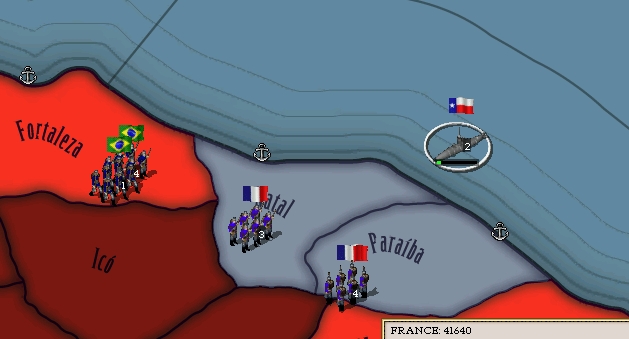
France, unlike last time around, has successfully landed divisions on the coast of Brazil and established a beachhead.
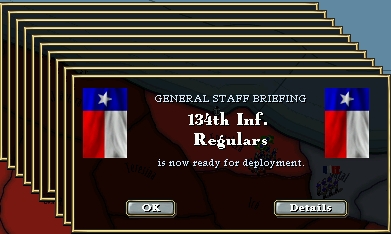
The Artillery-Infantry are ready. Once they are deployed to the coast, to be transported, President Villa reveals his secret weapon.
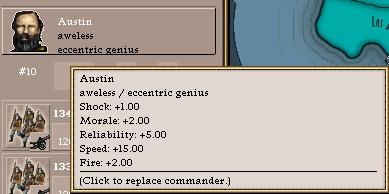
General Stephen F. Austin V. The great grandson of the nephew of the Father of Texas himself was the top of his class at the San Bernandino Military Academy and President Villa took him under his private tutelage after his graduation. Austin is destined to be one of the greatest generals the world has ever seen. He will be the commander of Pancho's "Golden Ten" Army.
(seriously, this guy is probably the best random general I've ever had)

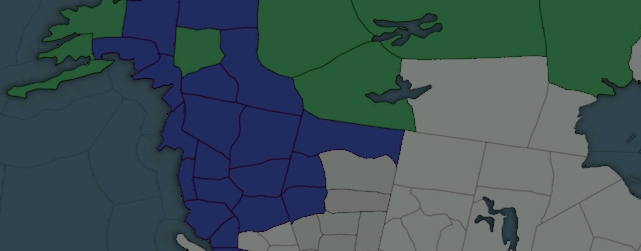
The United States wins their war against Russia, taking most of the Russian North American holdings. The Russians still hold some of the northernmost areas and the western half of Alaska.
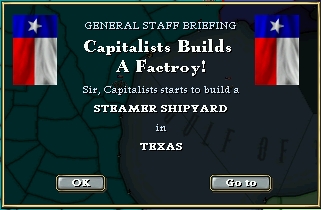
The State of Texas, which has seen little industrial growth in a while due to its low priority as an immigration destination, is getting a new factory. Another steamer shipyard is not frowned upon.
In the meantime, President Villa had the Golden Ten loaded onto their transports, heading to Rio de Janeiro. Another group of transports is on the way too, carrying twenty-six more divisions.
In the evening of August 9th, 1926, the President makes an announcement to his nation on the radio.
"We are ready."

War is declared on Brazil the next day. This is the second war started by Pancho against the Brazilians. Should Pancho's plans succeed, it will be the last.
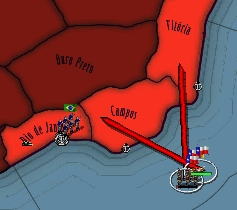
Our two main armies begin the amphibious invasion near Rio.
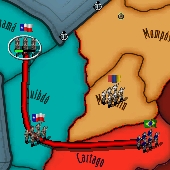
While that occurs, eight divisions from Panama will attempt to push through into Brazilian Colombia.
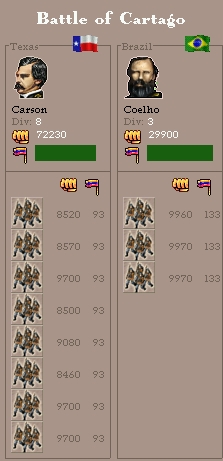
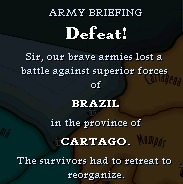
In Cartago (Colombia), the divisions arrive and engage the defending forces. The defenders are well entrenched, and we are forced to retreat after intensed fighting. The battle will hopefully serve its purpose: a distraction. The more attention they pay to Colombia, the less troops they will have to confront our troops near the capital.
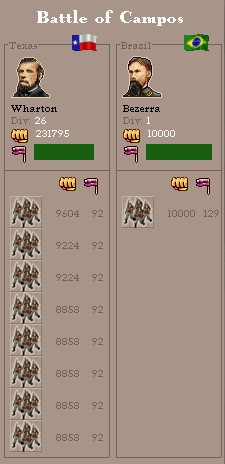
Meanwhile, in Campos (near Rio) our 26 division army under the mediocre General Wharton encounters a lone Brazilian division, which retreats at the sight of so many Texans.
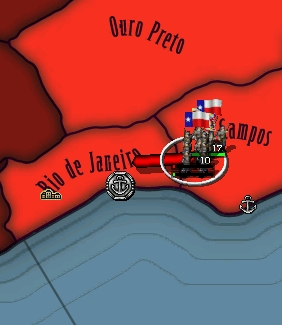
We never intended for the twenty-six division force to stay together; the attrition would be atrocious. The first split occurs shortly after the victory at Campos. Ten divisions are sent chasing the Brazilian division to Rio de Janeiro.
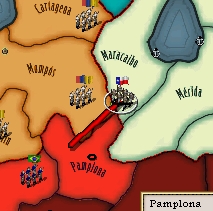
Back in the northwest, we find an opening on the Venezuelan-Brazilian border and are sending troops through to Pamplona.
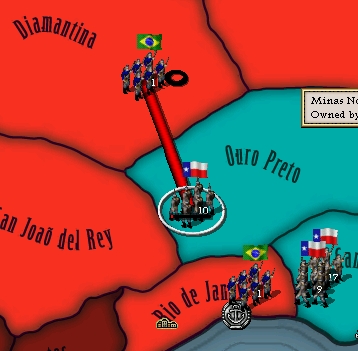
The effectiveness and speed at which General Austin and the Golden Ten operate is truly astounding. They seize two provinces and are heading into a third before the other divisions move from one province to the next. Everywhere Austin goes, he leave a trail of dead Brazilians.
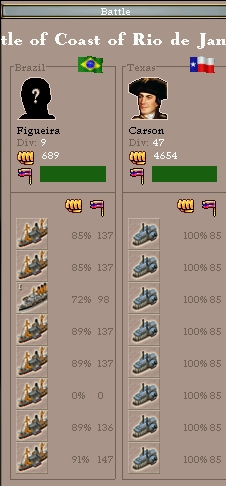
Brazil is trying to break our blockade of Rio de Janeiro and sends most of their navy to meet ours. Theirs is slightly outdated; the only thing outdated about ours is the hat our admiral wears. The Brazilian Navy puts up a fight but is ultimately sunk.
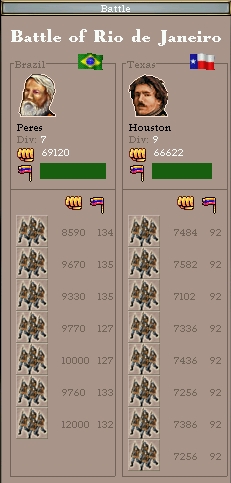
The Battle of Rio de Janeiro is not going well for the troops that were sent. General Houston, a nephew of the great President, is nowhere near as proficient as his famous uncle.
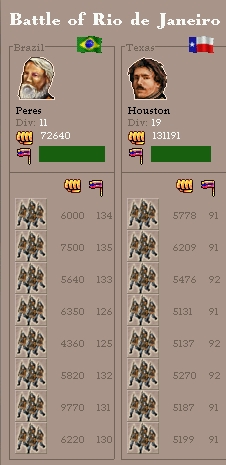
Ten more divisions are sent there to relieve the original ten that were taking heavy losses, and General Austin is sent to a nearby province where more divisions are stationed, to prevent the battle from becoming any larger.
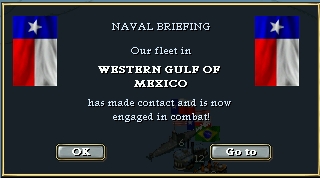
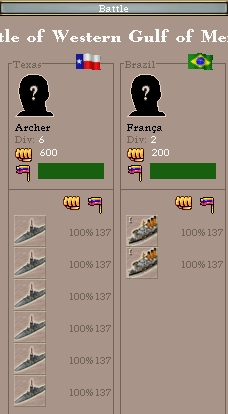
Ha! The sneaky Brazilians were going to attempt a naval invasion of the Republic, but we saw it coming and stationed six submarine divisions in the Gulf of Mexico. They caught the Brazilians by surprise, and the enemy ships were sunk.

The 22nd of November brings with it great news, as a few important battles come to an end in our favor.
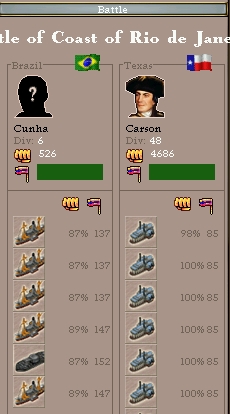
They really are sending everything they have at our navy, including a decrepit old monitor they've probably had for some time now.
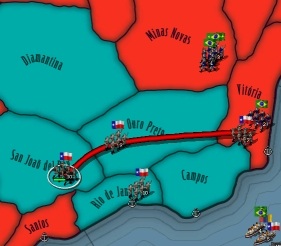
Our troops around Rio are carving out a small but growing area, thanks in large part to the Golden Ten. General Austin's great speed has proven invaluable; few battles are lost when he can join in and turn the tide if needed.
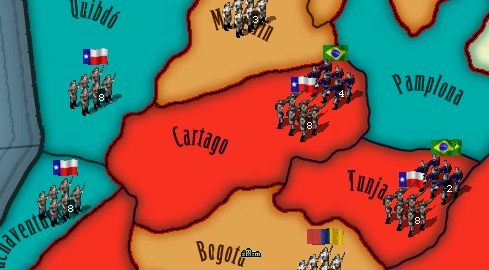
We try another, larger assault on Brazilian Colombia, since we've noticed that they are pulling troops out of there to go east, but we again are forced to retreat.
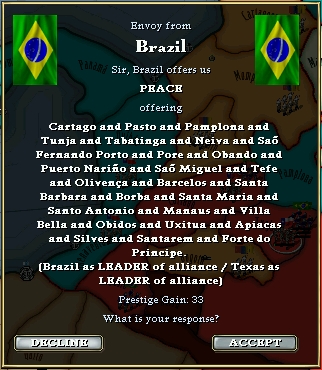
We receive the first peace envoy from Brazil. Though it swells us with pride to see our foe kneel before us and offer 26 provinces, we decline the offer, and make a counter-offer. It is not their land we are after. (also, I do not wish to regain a border with France or the UK. That would be Bad)
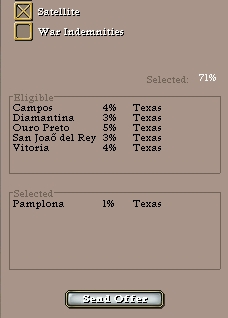
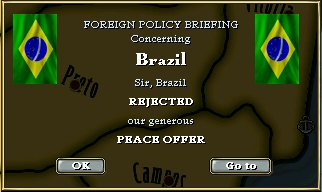
Our counter-offer is that Brazil cedes the province of Pamplona and becomes our satellite. We don't actually want to keep Pamplona, but we would be able to use it to get a province we do want later. The Brazilians stupidly reject. We will only push harder now.
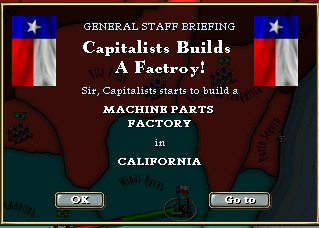
A new machine parts factory is going up in California. Our capitalists are finally in the habit of constructing high profit factories (when there's only 8 years left, of course).
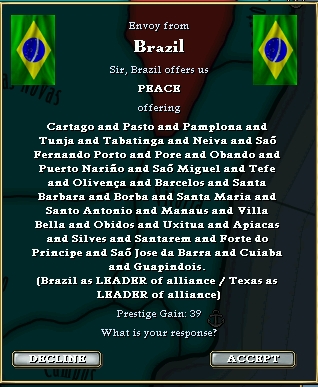
After our continued offensive, the Brazilians come to us on their knees again. We decline again, and offer the same counter-offer.
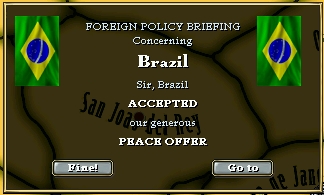
This time, they accept. Every nation south of Texas, except Colombia, is satellite of the Republic. And they won't be around much longer anyway.
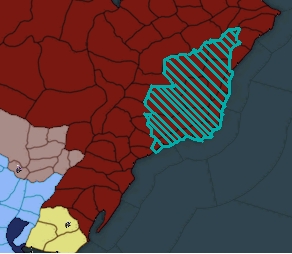
Shown here is the extent of our gains right up until the end. The Brazilians could not hold against the might of our armies, and especially the brilliant General Austin and his army.
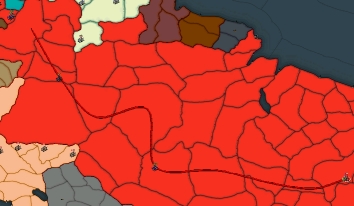
As we are ordering our men back onto the ships, General Austin has a different plan for getting his men back to Texan territory. He is going to make his way from Rio de Janeiro to Colombia on land, to prove his speed and skills as a general. Even as he travels through the harsh jungle of the Amazon, General Austin loses not a single man to attrition.
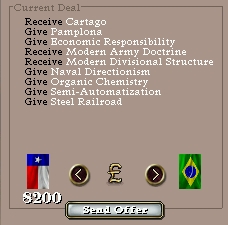
We trade some technology and land with our newest satellite. Brazil had researched farther into military technology than us, but we are ahead the other areas of research. We even this gap a little, and also give them back Pamplona for Cartago, which gives us a border with the Colombian isolated capital of Bogota.
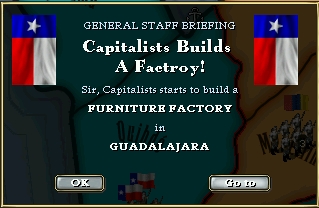
Going step-by-step through The Texan Capitalist's Handbook, the Guadalajarans begin work on their furniture factory (having completed a lumber mill not long ago).

We quietly declare war on Colombia and assault them from all directions.
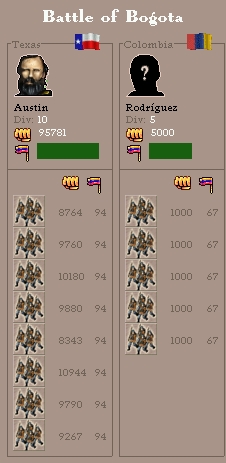
General Austin assaults Bogota. While the Colombians are well entrenched and the terrain is harsh, they are fighting at 10% capacity due to lack of funds, and Austin makes short work of them.
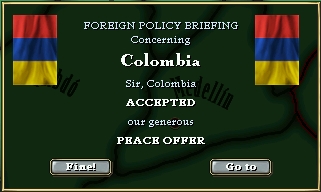
Before long we have seized all their land and force them to accept our peace offer: we take everything except Bogota (can't annex if they have more than 3 provinces and they had 4).
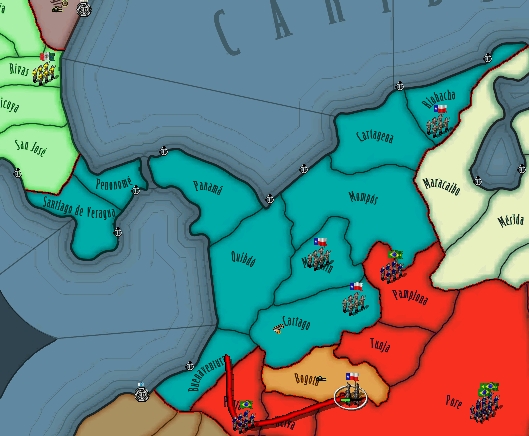
The new map of Texan Colombia and the Independent City of Bogota. As soon as our peace treaty expires, they should expect to be independent no longer.
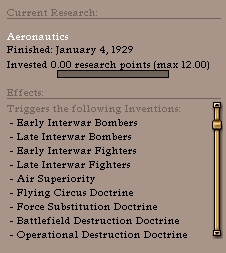
Our latest research is an exciting study of the use of these new "aeroplanes" in military operations.
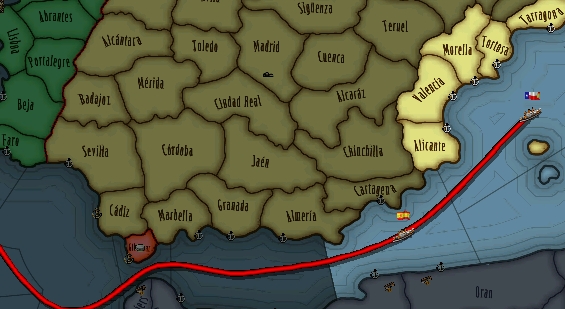
President Villa, lately, has been in a sort of conundrum: he does not know where to go next. South America, for all intents and purposes, is conquered. As is Central America. While we do want the Caribbean, it is still controlled by Europeans; the only independent nation, Haiti, would not be worth the trouble. Spain, however, is slightly weaker than the Republic, and it would be nice to have Cuba and the Phillipines. A number of full transports make their way to the eastern coast of Spain, in preperation for war against the Spaniards.
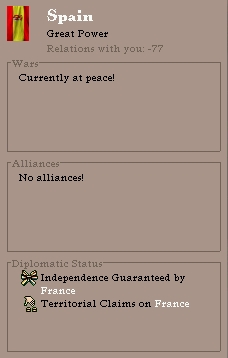
Pancho is informed that Spain's independence has been guaranteed by the French, as it has been since the Spanish-American War. Curse the French! Must they attempt to muck up all our plans? The invasion of Spain is scrapped, and Panch is put into a foul mood.
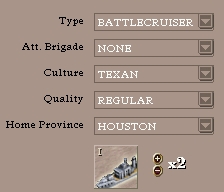
A pair of battlecruisers, the newest in Texan naval technology, are ordered built. Our Navy may be small, but it is formidable.

France has gone to war with Siam (Thailand). We suppose they are still seeking to expand their colonial holdings, but they are a little slow on the uptake.
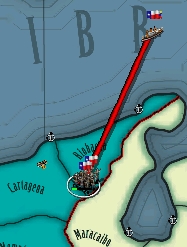
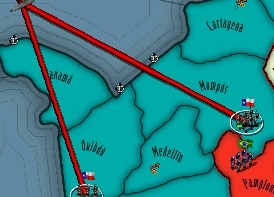
Panch thinks best when he is angry, and he comes up with a new plan. He remembers what he said when he was inaugurated, that he would make the Republic the premier nation in the Americas. He lets no one know of what the plan entails. All that anyone knows is that it will be big, since President Villa is recalling every troop to the Republic proper (leaving one division in Colombia to handle revolts).

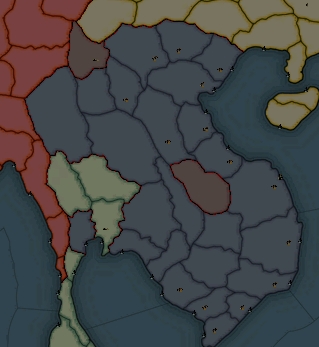
The cruel French force the Siamese to cede most of the northern half of their country, ending the short conflict there.
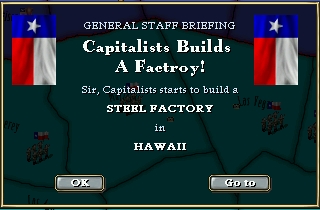
Much like Texas, Hawaii has not seen much industrial growth for a while. But now a new factory is going up, a steel factory. When this factory is completed, the automobiles made in California will be made entirely from parts and materials also made in the Republic.
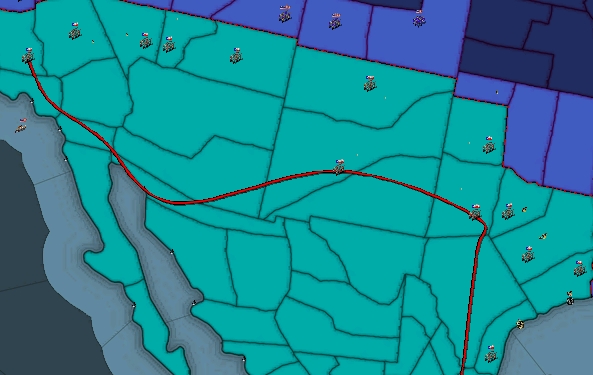
The politicians in Austin and the populice in general grows increasing anxious to know what Pancho's new plan is. All of our recalled troops are being stationed along the northern border with the United States, and the 26 division army has reformed and is in San Fransisco. But we still have good relations with the US, so Pancho's plan is still not clear.
In the evening of December 18th, 1929, President Villa gives a speech to his people in front of the capital building in Austin, and it is broadcast live on the radio. The President reiterates our victories in the south, our final triumph over Mexico, and the lessons we've learn since. He then asks the nation to trust him:
"I ask you, the people of the Republic, for your trust, and for you to remember the promises I have delivered on, for now you must listen.
Almost ninety-three years ago, the people of this Republic fought for the right for it to exist. And with the help of the United States, we won our freedom. For many years we depended upon them for protection.
Almost thirty years ago, a great man asked us to fight against Mexico not as defenders but aggressors, and we accomplished it on our own, without help from the United States, proving again our right to exist.
And yet still we have not been independent. America still thinks we need their protection; they still "guarantee our independence"; they still look down on us.
No longer, Texas. Tomorrow, we will prove that we control our own fate. Tomorrow, we will prove that we have the right to be the greatest nation to grace this earth.
Tomorrow, we will declare war upon the United States of America.
And we will win.
Goodnight, and sleep well, Texas. For tomorrow we embrace our destiny."

This is the end of the year 1928, the end of 92nd year of the Republic of Texas, and the beginning of its greatest hour.